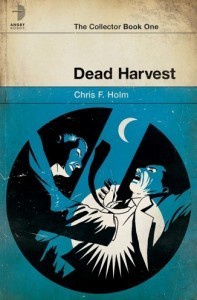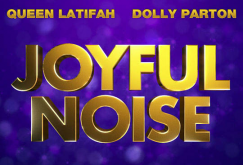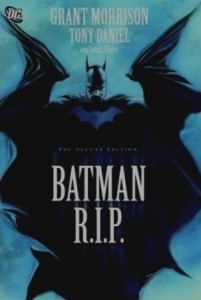Maurice Broaddus's Blog, page 42
December 6, 2011
Just Don't Marry One
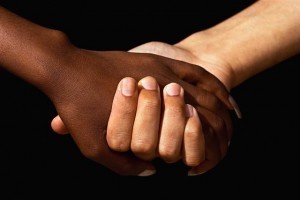 (AKA So Jesus saith, "It's twue, it's twue.")
(AKA So Jesus saith, "It's twue, it's twue.")
I sat with this story for a while (which some of my friends took for me not seeing it, so thanks all of you who sent me links). I think the thing that struck me most about this news report was how everyone seems so shocked that this could go on this day and age (or, conversely, writing off the incident because it happened in a small church in Kentucky). Yes, it's news because it shocks our sensibilities and should be decried when spotted. Still, it's not as if interracial dating wasn't just unbanned in 2000 at Bob Jones University or that Jim Crow wasn't alive and well only a couple years ago. Surely this must be a product of their provincialism and isolation, right? This whole episode took me back…
I grew up in a conservative church in Indianapolis, Indiana. I'll grant you that my city isn't exactly as cosmopolitan as a New York or an L.A., but, despite its detractors, it's also not a backwater hayseed town either. I was in an interesting place in my church and my life as the only black guy in our youth group/singles group (the basis for my upcoming story, "Whispers at the End of Creation" in the Relics & Remains anthology) and having my lack of identity/self-hate baptized by the church. Already questioning a lot of things about what a faith community should look like (i.e., loving) and not being satisfied with the answers I was hearing, I had one foot out of the door and the other in the Nation of Islam (as I was tired of the monochrome nature of my world and was ready for a change).
The final push/bolt came with our conversations over interracial dating. The topic typically came up as a sort of pre-emptive strike, as I was single and my very presence alone meant that I had an unspoken "where're the white women at?" sign wherever I went (the double irony being that at the time, interracial dating was the furthest thing from my mind and now that I *am* married interracially). What lit my fuse was their use of the Bible to defend their belief.
Ignoring the more ridiculous claims (the mark of Cain, the curse of Ham, etc.) or evidence to the contrary (Moses' marriage, the women in Christ's genealogy), the arguments came down to two ideas: 1. "do not be unequally yoked" (2 Co. 6:14) and 2. the tenor of the Old Testament being that the races were to remain separate (one should always be wary when clinging to Leviticus to make one's defense. For the record, both of these arguments are easily torn to shreds as those interpretation fly in the face of, you know, the rest of the Bible and Christ's mission of reconciliation not separation. So when pressed, the bigotry was clearly encapsulated in the sentiments that "we" (black people, that is, as interracial dating conveniently was only defined as black and white people dating) were okay to be friends with, just don't marry one. But since no one wants to be seen as racist, sometimes the defense came down to the fact that we had to think of the children, who'd never have a place because they'd be rejected by both sides (which, again, says a lot if their default belief is that kids would automatically be ostracized rather than becoming bridges of reconciliation).
Mind you, this was just in the early 1990s.
Let's face it, we want truths that fits into what we're comfortable with and that mindset can deceptively set us on wrong paths. If, in your reading of the Bible, it only seems to confirm what you already think, then you're probably mis-reading the Bible. If, in your reading of the Bible, you never come across anything that upsets or challenges you, you're probably mis-reading the Bible. You can't go to the Bible to prove what you want to say, using it simply as a vessel to prop up your own authority. Racists use the Bible and bring their bigotry, their agenda, to its interpretation.*
So no, I'm not surprised to find out there are still bastions out there who make take an exegetical position that boils down to "Somewhere in the Old Testament it said 'please don't date our daughters'".
We're not quite a post-racial church and there is the need for continuing conversations when it comes to racial reconciliation. But for those in that church who say that their stance doesn't make them racist … yes, yes it does.
*I don't hold the Bible or Christianity responsible for their ignorance. If people do something stupid in the name of science (for example, the racist anthropologists who codified the idea of race in the first place), I don't hold science responsible but those "scientists" and their individual bigotry and their misuse and/or missing the point of science.
December 1, 2011
Books I'm Reading
AKA The TBR stack never dies…
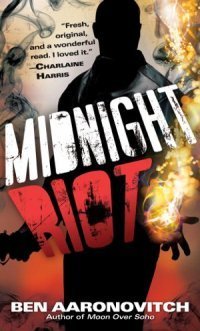 I'm a horribly slow reader. These days I rarely get to read for pure amusement (not when there's so much television to watch!) I try to be choosy about what I read, the bulk of the stuff I read having already been vetted/vouched for by friends whose opinions I trust. But every now and then, books either get sent to me or I have made an excuse to read them.
I'm a horribly slow reader. These days I rarely get to read for pure amusement (not when there's so much television to watch!) I try to be choosy about what I read, the bulk of the stuff I read having already been vetted/vouched for by friends whose opinions I trust. But every now and then, books either get sent to me or I have made an excuse to read them.
Ben Aaronovitch – Midnight Riot
Here's my issue with Ben Aaronovitch: he needs to quit working my side of the street. Crime driven urban fantasy is what *I'm* supposed to do. I just meant to casually flick through Midnight Riot, but his stuff is wildly addictive. It has all the stuff that I love: a non-stop thrill ride fueled by great characters and pitch perfect dialogue. Seriously. I don't need that kind of competition, especially from writers who make their literary crime sprees seem so effortless. My take home lesson has been that if I'm on a writing deadline, I can't pick up Aaronovitch. He's a thoroughly, thoroughly, entertaining distraction. (Angry Robot)
Speaking of which, I need to stop Chris F Holm before his book comes out. I have been perusing the ARC of his upcoming release, Dead Harvest. Here's the thing, crime novels are my favorite reads (I'm on record as being a huge George Pelecanoes fan). So a mix of horror and crime is pretty much speaking my love language, and Holm enjoys writing love letters to my soul apparently: "Sam Thornton collects souls. The souls of the damned, to be precise. Once taken himself, he's now doomed to ferry souls to hell for all eternity, in service of a debt he can never repay. But when he's dispatched to retrieve the soul of a girl he believes is innocent of the horrific crime for which she's been damned, Sam does something no Collector has ever done before: he refuses." (Angry Robot)
Benjamin X. Wr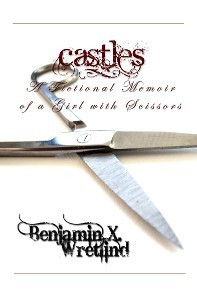 etlind – Castles: A Fictional Memoir of a Girl with Scissors
etlind – Castles: A Fictional Memoir of a Girl with Scissors
Benjamin X. Wretlind is one of those writers no one has heard of but whom I've kept my eye on. I keep waiting on him to break through and take the small press by storm. With his collection, Regarding Dead Things on the Side of the Road, he showed some promise. Now I have his book, Castles: A Fictional Memoir of a Girl with Scissors. Maybe now he'll find a wider audience.
Pandemonium: Stories of the Apocalypse
For matters of complete disclosure, I was asked to be in this anthology. Tried as I might, due to a bunch of deadlines slamming together at the same time, I couldn't find the time to actually write the short story in my head (I had the story and characters pretty fully formed). I had to turn down a few writing gigs which stunk because the final product looks great and I missed an opportunity to share a TOC with Lauren Beukes, my tentacle partner in crime.
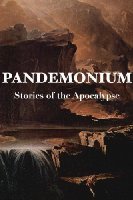 Some things I am reading in order to get in the mood for whatever writing project I'm doing next. I know many writers read outside of their genre as not to "cross-pollinate", but I enjoy reading in whatever genre I'm writing. I'd say it's sort of like creative/mental foreplay, but that's far too graphic an image for me to go for. So good thing I didn't say it. Among those titillating my imagination are
Some things I am reading in order to get in the mood for whatever writing project I'm doing next. I know many writers read outside of their genre as not to "cross-pollinate", but I enjoy reading in whatever genre I'm writing. I'd say it's sort of like creative/mental foreplay, but that's far too graphic an image for me to go for. So good thing I didn't say it. Among those titillating my imagination are
Currently out of print, hopefully someone will be re-releasing it soon. I've been a fan of Paul's writing for a long time. His works are complete mind trips. He reminds me of a young Grant Morrison: he just keeps throwing wild idea after wild image after wild plot at the reader. You read the first few pages, wonder where he's going, and just when you think you have a handle on the story, he veers in a totally different direction. And his prose hurtles along with a mad fury, sort of like violent poetry.
Jason Sanford – Never Never Stories
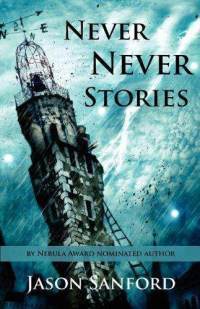
Anyone who has ever run across Interzone magazine or has heard of the Million Writers Award is probably familiar with Jason Sanford. I fell in love with him after reading his novella, Sublimation Angels. Which means when he asked if I'd like an ARC of his Never Never Stories, a collection of his short stories, I didn't hesitate to crawl through Teh Interwebz to get a copy. It's one stop shopping for SF goodness from a modern master on the fast track.
None of this includes books on theology (like Scot McKnight's The Jesus Creed for Students) or issues I'm thinking through (like Dan Allender's Leading With a Limp). Nor does this include comic books…which I keep swearing that I'm done collecting but then special projects come up or, well, the library has so many trades now…
So much great stuff to read. All in all, a good problem to have, but who knows how long it will take me to get through all of these, and the TBR doesn't exactly shrink while I wait.
November 28, 2011
Writing Daily
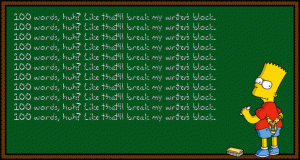 Okay, it's Day 21 of NaNoWriMo. So far, I've written three words. Apparently I've decided to spot November three weeks and then pull together a novel in just over a week. Or maybe not. I wrote the first draft of King Maker during a NaNoWriMo, though the final version of it was nearly double what was produced during NaNoWriMo. But the process of tearing through a first draft in a month was a valuable exercise, if only to prove to myself that it could be done (a skillset which has since proven quite handy).
Okay, it's Day 21 of NaNoWriMo. So far, I've written three words. Apparently I've decided to spot November three weeks and then pull together a novel in just over a week. Or maybe not. I wrote the first draft of King Maker during a NaNoWriMo, though the final version of it was nearly double what was produced during NaNoWriMo. But the process of tearing through a first draft in a month was a valuable exercise, if only to prove to myself that it could be done (a skillset which has since proven quite handy).
I've often gone around and around in circles with myself on the importance of writing daily. It's like any discipline that one seeks to acquire in order to further growth in an area. Take "personal devotions" (daily prayer and Bible reading), for example. Personal study and prayer are vital parts of a growing spiritual closeness with God. However, I grew up in a church where you were made to feel like a bad Christian if you didn't start each day with Bible study and prayer time. Instead of intimacy, I was shackled with some new chains of false guilt, reducing what should be the natural development of a relationship between me and God into some legalistic rule.
So I don't want to needlessly burden myself with any sort of needless guilt about the notion of "write every day." It's one of those bits of advice newbie writers get all the time (along with "read everything" and "finish things"). Too often I read on blogs or twitters "reports" on how much said author has written that day. Always generating within me a variety of responses (not the least of which is dropping their blog or twitter from my feed if they mostly consists of such reports).
I can't write everyday because I'm not always in a frame of mind to write. Sometimes life happens and the mind is chaotic and you produce a pile of words which need to be pitched in your next round of revision anyway. All of that being said, arguably, I always write. Ideas shape themselves and pool in the back of my head, even without pen put to paper. Plot kinks get worked out. Characters gradually introduce themselves to me. While we believe that our creativity can't be turned on and off like a faucet, the reality is that it/you can be trained to go into that zone more easily. A stimulated mind and the pressure of a looming deadline do provide the right alchemy to put words on a page. As always, the most difficult part of writing is actually planting my behind in a chair and putting my pen to paper. And the habit of developing that discipline lies at the heart, and is the point, of writing every day.
And I don't want to miss the point of why I write: for the love of telling story (and pay). So … write.
The "write every day" dogma, like much other advice on writing, should be taken with a grain of salt (or rather, like salt, should be adjusted for taste as it suits your writing "recipe"). In the meantime, I've written 545 words for this blog post. I'm off the hook for today.
November 24, 2011
Joyful Noise – A Review
Joyful Noise is the kind of movie you want to love. It has many of the right pieces for a family, feel good movie. While not exactly a pair we'd expect to see at Wal-Mart hanging out, there is Dolly Parton (9-to-5), a diva in winter, and Queen Latifah (Stranger than Fiction), a diva in mid life, both of whom have personality to fill ten screens worth of movie chewing up scenery AND getting to belt out catchy songs. Even the most generic of scripts should be able to provide enough set up to let them do their thing and entertain an audience of ninety minutes. Alas …
When choir director, Bernard Sparrow (Kris Kristofferson) passes away unexpectedly, the mantle of leadership passes on to Vi Rose Hill (Queen Latifah) rather than his wife, G.G. (Dolly Parton), thus stirring the pot on their simmering rivalry. Vi Rose is a single mom—since her husband, played by Jesse L. Martin, skipped out on them via the military—holding her household together, taking care of her son, Walter (Dexter Darden) who has Asberger's Syndrome, and her hot and anxious to date teenage daughter, Olivia (Keke Palmer).
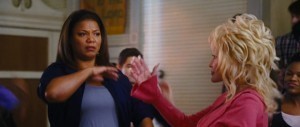 G.G., on the other hand, has recently taken in her ne'er do well nephew, Randy (Jeremy Jordan), who immediately is drawn to Olivia. G.G. also happens to be the major donor to their church as their choir continues to battle their way through a choir competition. Olivia and Randy are the new generation of the choir, wanting to take things in a new direction, while Vi Rose and their pastor, Pastor Dale (Courtney B. Vance, between he and Martin, the movie serves as a safehaven for Law & Order alums), wants to keep things in a more traditional vein.
G.G., on the other hand, has recently taken in her ne'er do well nephew, Randy (Jeremy Jordan), who immediately is drawn to Olivia. G.G. also happens to be the major donor to their church as their choir continues to battle their way through a choir competition. Olivia and Randy are the new generation of the choir, wanting to take things in a new direction, while Vi Rose and their pastor, Pastor Dale (Courtney B. Vance, between he and Martin, the movie serves as a safehaven for Law & Order alums), wants to keep things in a more traditional vein.
With the town facing difficult economic times, the show choir trying to make regionals gives the townsfolk something to have hope in. Throw in the numerous musical numbers and there is more than enough going on for any movie. Once you add the numerous subplots—the journey of Walter in wanting to be normal, the romantic entanglements of the choir members, the Romeo & Juliet romance between Olivia and Randy (including rival suitors)—and you have a movie that unspools over all over the place not quite sure what story it wants to tell.
"I just don't see what's so great about God." –Walter
One of the spiritual themes that runs through the movie is the wrestling with the question "Why?": why is the town suffering? Why did Bernard have to die? Why did God allow bad things? (as Walter points out, in referring to his condition, that "He's who did this to me.") Queen thinks of God as a parent and that we trust in Him as a father even when we don't understand Him. Her theodicy, a justification of God, is one way to reconcile the idea of a good, all powerful God and the reality of evil. The fact of the matter is that God is good and is also omnipotent. God created a world which contains evil and had a good reason for doing so (for reasons of greater good that we don't understand right now). So the fact that the world contains evil is consistent with a Christian view of God. Yet we still want this all knowing, all powerful God to do something about the evil. We want to accuse God, point out how He has screwed up and turned His back on us for too long. We're tired of His seeming silence and indifference to our sufferings.
The image of God as both good and severe, a God that fit readily into our (Old Testament kind of) paradigm, was gradually replaced with that of a one-dimensional, only-good God, as if Love is the only dimension of who He is. There is nothing wrong with seeing God as good, as long as you realize that is not all He is. We have many sides to us, so we can only imagine how complex He is. We forget passages like "Make sure you stay alert to these qualities of gentle kindness and ruthless severity that exist side by side in God" (Romans 11:22a, The Message version). But this is something to continue to wrestle with, though the short answer is "I don't know."
"God judges a man on two things: on his faith and on the content of his heart." –Pastor
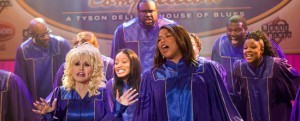 With Dolly Parton and Queen Latifah, Joyful Noise has two generations of down to earth divas not allowed to truly cut loose and do their thing. It doesn't know how to give them stuff to do, so it keeps throwing storylines like hard dinner rolls hoping to nail its audience. Both have proven comedy chops but aren't given enough space to lift this mediocre mess. Even sleepwalking through this script, they still easily outshine the young leads on whom the film truly rests. Though predictable and earnest, it is buoyed by great music. However, even that's not enough to rescue a movie so unsure of itself and its laughs. As The Bad News Bears of the gospel music set (with Queen Latifah's rallying speech being a riotous highlight), Joyful Noise showed flashes of what it could have been.
With Dolly Parton and Queen Latifah, Joyful Noise has two generations of down to earth divas not allowed to truly cut loose and do their thing. It doesn't know how to give them stuff to do, so it keeps throwing storylines like hard dinner rolls hoping to nail its audience. Both have proven comedy chops but aren't given enough space to lift this mediocre mess. Even sleepwalking through this script, they still easily outshine the young leads on whom the film truly rests. Though predictable and earnest, it is buoyed by great music. However, even that's not enough to rescue a movie so unsure of itself and its laughs. As The Bad News Bears of the gospel music set (with Queen Latifah's rallying speech being a riotous highlight), Joyful Noise showed flashes of what it could have been.
November 23, 2011
Advice After a Big Sale
 (Aka Don't Let Publishing Turn You Into a Delta Bravo)
(Aka Don't Let Publishing Turn You Into a Delta Bravo)
Writers Groups are an interesting breed of beast. In the ideal, you have people at various stages at their careers, each unthreatened by any other, especially their success, and thus are able to contribute freely and openly. I was asked recently how does one handle themselves within a group of fairly newbie writers after they have gotten a pretty big sale. I simply said "don't follow my example."
Look, writers have egos and no one wants to be thought of as the newbie writer, thus everyone is quick to shout their credentials, or tout their successes. Basically, we're caught up in the mindset of writing as a zero sum game, with someone else's success somehow coming at your expense. It takes a while to realize that's not the case, so in the mean time, too often in a writers group the individuals are too busy playing "alpha writer." So when someone makes a big sale, it's easy for them to suddenly think their feces has a particularly perfume-like aroma.
"I've been published in an anthology with [fill in the blank]". It's hard to believe folks would actually lead with that, but the thing is that I KNOW it's tough to NOT lead with that. As writers, after years of decorating your walls with rejection letters, you grasp onto your victories where you can get them. When I got into the Dark Dreams anthologies, it was hard not to pull out the "do you know who I am?" card (despite the fact that it never got me anywhere. It was just self-gratifying to whip out the card). But suddenly no writing group I was in could tell me ANYTHING about writing (my writing in particular) because this major anthology series had bought one of my stories.
Nevermind the fact that I was still "and others", that is, *I* was just another story folks skipped over on their way to Zane, Tananarive Due, or Eric Jerome Dickey. Eventually I settled down. INSIDE, I was still published alongside some great writers, which meant I thought a lot more of my work. I also thought a lot more about the quality of markets I sent that work to, and I simply demanded more out of myself, out of the markets, and out of success. OUTSIDE, I didn't need to say anything. Resumes speak for themselves (someone once made the observation about author bios in the back of books or in programs that the more accomplished the author, the shorter the bio … unless they just HAVE to club a newbie over their head with their credentials).
So, you let your success affect how you carry yourself professionally. Bragging/speaking about it makes you sound like a douche. In case you're wondering, only in the last few years has my douchiness been "forgiven" in the group. No matter your level of success, no one stays hot forever. So there's no point in being a D.B. once I've "made it" since, as the adage goes, those I pass on the way up are those I will pass on the way down. Anyway, I don't have to prove myself to anyone. I just have to write the best stories I can. I can be satisfied with that.*
File Under: The Emotional Life of Writing
-Inhabiting the Space of Characters
*As long as the check clears
November 15, 2011
The Muppets – A Review
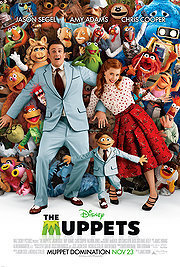 It's been a long time since The Muppets were a cultural phenomena. In the 1970s and 1980s, The Muppet Show lit up many a household. When it first aired in 1976, many people questioned if a show about puppets would find an audience among adults. Back then, creator Jim Henson called in favors to get stars, but it didn't take long for many of the pop culture icons to ask to appear on the show: Paul Simon, Elton John, the cast of Star Wars. The 1980s brought us The Muppet Babies cartoon series as well as the movie spinoffs until the Muppets faded into obscurity. The current pop culture waters, however, are being properly chummed for their comeback.
It's been a long time since The Muppets were a cultural phenomena. In the 1970s and 1980s, The Muppet Show lit up many a household. When it first aired in 1976, many people questioned if a show about puppets would find an audience among adults. Back then, creator Jim Henson called in favors to get stars, but it didn't take long for many of the pop culture icons to ask to appear on the show: Paul Simon, Elton John, the cast of Star Wars. The 1980s brought us The Muppet Babies cartoon series as well as the movie spinoffs until the Muppets faded into obscurity. The current pop culture waters, however, are being properly chummed for their comeback.
The Muppets movie picks the story up with the Muppets biggest fan, Walter (himself a Muppet), and his his friends Gary (Jason Segel, both a huge fan and the screenplay writer) and Mary (Amy Adams) from Smalltown, USA. They travel to Los Angeles on vacation where Walter overhears oilman Tex Richman's (Chris Cooper) plan to tear down the old Muppet Theatre so that he can drill for oil. Walter and company search for Kermit—who has been living in and old mansion along with his memories of the old gang—in the hopes that he can hatch a plan to save the theater. In a plot recalling The Blues Brothers, they opt to put the band back together, in this case, to host The Greatest Muppet Telethon Ever to raise the $10 million needed to stop the oilman's plan.
The rest of the gang has gone their own way, equally toiling in the shadow of their former glory. Fozzie now performs with a tribute band called the Moopets; Animal is in residence for anger management; Gonzo has become a plumbing tycoon; though Miss Piggy has become a plus-size fashion editor at Vogue Paris.
"A hard, cynical act for a hard, cynical world." –Tex Richman
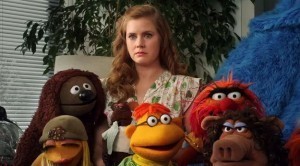 The real plot (and test for the movies) seems to be whether or not they can get people to care about the Muppets again. It has been so long that people have forgotten about them. An entire generation doesn't know who they are. We live in a world without Muppets, a world that has forgotten Tab and Real Coke. It has moved on, and The Muppets may be too irrelevant, too happy, and too heartwarming, mistakenly dismissed as smaltzy. Which would be a mistake.
The real plot (and test for the movies) seems to be whether or not they can get people to care about the Muppets again. It has been so long that people have forgotten about them. An entire generation doesn't know who they are. We live in a world without Muppets, a world that has forgotten Tab and Real Coke. It has moved on, and The Muppets may be too irrelevant, too happy, and too heartwarming, mistakenly dismissed as smaltzy. Which would be a mistake.
The Muppets represent a childlike innocence, but also the resiliency of hope. That things don't have to be dark and cynical in order to be relevant. That there can be humor that neither talks down nor denigrates others. That fun can still be had without the need to wade through a cesspool. Being nice feels like a throwback to an earlier age.
"Just because you haven't found your talent yet doesn't mean you don't have one." –Kermit
One of the overarching themes of The Muppets is that journey Walter takes in order to discover who he is meant to be. It's a journey we all have to take. To recognize that we are all eikons, image-bearers of God; worthy of respect, value, and love. We participate in the Divine Being, meant to partake in the Divine Life and Happiness. We were created in love, for love, and are to open ourselves to the possibility of love. Our "fallenness" becomes about not living up to that potential, what we were created to be. But there is hope, as we seek wholeness, being restored in all the dimensions of humanity. And in that grace, we're moved toward outward expression, 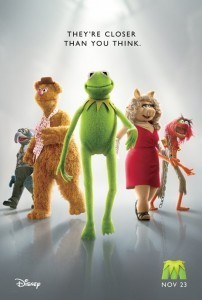 joining our talents with the Kingdom of God as we pursue a mission of reconciliation, of restoration.
joining our talents with the Kingdom of God as we pursue a mission of reconciliation, of restoration.
"Even the sunniest days can have a few clouds in them." –Walter
The Muppets serves as a coming out party (or better yet, a welcome back) for The Muppets. It would be easy for it to skate by on nostalgia while striving for relevance in a new generation, yet it manages to feel updated without succumbing to the pressure to become "relevant" (read: edgy). This movie is for parents who grew up with the Muppets as they introduce their children to them. A whole new generation of stars pop up in this movie: Jack Black, John Krasinski, and Selena Gomez to name a few. Keeping their fingers on the pulse of pop culture, The Muppets cover several songs from Nirvana's Smells Like Teen Spirit to Cee Lo's Forget You. The movie plays to its strengths, with the Muppets being silly, innocent, and chaotic, in other words, like children running amuck. It's good to see The Muppets again, but let's not wait another generation to show up.
November 14, 2011
Being Mauricenary
 So my friend, not to mention brilliant writer, Monica Valentinelli began texting me from a novel writing conference she happened to be attending. "What is with this attitude that writing for money is evil? Why can't I love to write AND make money?" Don't get me wrong, as professional writers, we know better than to believe writing is our sure path to riches. That being said, there is this attitude that bubbles among some writers, typically self/under/poorly-published ones where some of us are told with some measure of disdain that writing for a big publisher makes us a "house slave" or we are informed with equal condescension that they are an artist who cares about story and thus don't have to worry about writing.
So my friend, not to mention brilliant writer, Monica Valentinelli began texting me from a novel writing conference she happened to be attending. "What is with this attitude that writing for money is evil? Why can't I love to write AND make money?" Don't get me wrong, as professional writers, we know better than to believe writing is our sure path to riches. That being said, there is this attitude that bubbles among some writers, typically self/under/poorly-published ones where some of us are told with some measure of disdain that writing for a big publisher makes us a "house slave" or we are informed with equal condescension that they are an artist who cares about story and thus don't have to worry about writing.
I'm going to pause here because Tobias Buckell put on a clinic on his blog on the kind of rhetoric which takes on a new level of offensiveness with those of us people of color. He said things so much better than I could.
Monica's experience reminded me that I probably come across as the exact flipside of the attitude she encountered. I was at the Indiana Horror Writers meeting a few weeks ago saying that I won't roll out of bed for less than five cents a word. I know I can sound mercenary, or as Lon Prater dubbed it, Mauricenary. Again, let's be straight, five cents a word isn't much. No one is going to make a living, much less get rich, working for five cents a word. I simply wanted to drive home the point that as much as it clashes with our delicate artistic sensibilities, money is the driving force of our industry. It's the business of writing that propels the art of writing.
The fact of the matter is that you can find endless places who will take your stuff if they don't have to pay you. You will be invited into all sorts of anthologies, and, believe me, I understand that initial thrill that comes with being invited into a project rather than having to scrap and claw and submit. However, I also know that you can get trapped there at that level, still pursuing or clinging to the dream "exposure". The same level of exposure you can get on your own, especially if you put any work into it (thus one of the arguments of the self-published; one I agree with, mind you. I can't stand when writers act like all they have to do is slap a cover on their work and throw it out there. That's an equally bad attitude and that lack of quality control is what ultimately hurts the ranks of the self-published).
When all is said and done here's what I care about: 1) telling good stories and 2) making sure they're read. The former focuses on my craft, the need to keep reading widely and deeply, the need to keep honing and experimenting with my style. The latter focuses on the business, things like money, distribution, promotion.
A writing career, which is what I'm trying to do (as opposed to writing hobbyists) is about building a reputation as well as readers. I want to be where I'll be read and for paying markets, it's in their interest to build readership to keep their doors open. For example, Dark Faith was Apex Books' most expensive project. Therefore, it was in their interest to make sure it sold. They pulled out all stops in terms of marketing and promotion. Other Apex projects felt on the short shrift of not being marketed as hard. The reality was Apex had to invest in its promotion and go that extra level, which devoured a lot of resources. But that investment means that the market I have sold my story to has an equal investment in finding me as many readers as possible.
Pursuing payment also allows the newbie writer who might not know the scene as well to avoid a lot of scammers [David Boyer says what] preying on writers. Let's face it, because of the ease of technology, anyone can slap together a project, declare themselves an editor, and not have a clue what they're doing (other than padding their resume). The adage "money flows TO the writers" protects against a lot of that.
Story is my magic canvas. I'm a professional day dreamer, cloaking myself in my safe little Walter Mitty-esque world of spies, ninjas, assassins, dragons, monsters, demons, and magic. I write because I love to tell stories. I write because I have an inner compulsion with drives me to put pen to paper. I write because I have the tacit hubris to believe I have something to say. I write because that's who and what I am: a writer.
 I write for pay because I want to be read as widely as possible. I write for pay because I have the tacit hubris to believe something I've written deserves to be read. I write for pay because I have the less than tacit hubris to want to be paid for my efforts. I do want to get paid, and possibly be able to do this full time as my sole means of income … so that's part of the long term dream. And I am a creature of pride, meaning, that I would also love the recognition of awards (including the "award" of huge sales). Of course I still have to chase down royalty statements and checks. Just like I still make exceptions for when I'd writer without a check (such as if I am doing a favor for a friend or if I really dig the project). I never want writing to get to the point where writing is a chore or something I dread (a risk with the mad scramble to SOLELY chase dollars).
I write for pay because I want to be read as widely as possible. I write for pay because I have the tacit hubris to believe something I've written deserves to be read. I write for pay because I have the less than tacit hubris to want to be paid for my efforts. I do want to get paid, and possibly be able to do this full time as my sole means of income … so that's part of the long term dream. And I am a creature of pride, meaning, that I would also love the recognition of awards (including the "award" of huge sales). Of course I still have to chase down royalty statements and checks. Just like I still make exceptions for when I'd writer without a check (such as if I am doing a favor for a friend or if I really dig the project). I never want writing to get to the point where writing is a chore or something I dread (a risk with the mad scramble to SOLELY chase dollars).
Not that I should have to justify wanting to get paid for the work I put into something, especially if I value it or my time. Should I never be able to get another book deal or sell another story, I would keep writing. It's why I have a blog: to allow me to put my thoughts into the great expanse. If I wanted to write 4theluv, I'd just stick my manuscripts in a drawer.
November 13, 2011
Testrogenfest 3
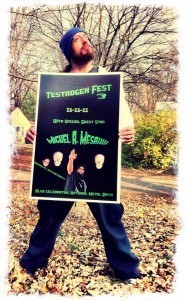 AKA Learning and loving in community
AKA Learning and loving in community.
I have this friend whom for the sake of this blog I'll call Rob Pallikan. I met him at my previous church and my relationship with him is one of the things I'll always appreciate about that particular church experience. Rob's an amazing guy with a big heart for people and a bigger heart for God. He works at Outreach Inc, he's amazing with kids, and is completely unashamed of his collection of original Star Wars figures (still in their original boxes) retains a child-like joy and wonder as he trips through life.
Currently, we each go to two different churches, but we both share a belief that relationships have to be intentional, and people pursued. It's so easy for people to breeze in and out of our lives. It's easy in this day , age, and culture, with people being so busy, to let a lot of time pass between phone calls, getting together, and basically putting in the work to maintain relationships.
.
Every month or so, Rob loves to organize what he has dubbed "test fests". We get together and watch "manly" movies and drink manly drinks and eat manly food and do manly things … which somehow usually end with us sitting in a circle discussing our feelings. Our jobs (or lack thereof), our marriages, how we can be better husbands, fathers, friends, everything is on the table to talk about, and we end up praying for one another as we stare into the firepit. (I wonder if I've just violated the first rule of Test Fest by talking about Test Fest*).
.
Over the weekend Rob just had his third annual Testrogenfest, when we have the occasion to bring our delightful spouses along with us to share in our antics (let's be straight, none of our wives are or can be shocked: they know who they married and know what we're like when we get together. And though our wives retain their image of patient saints, we all know they are just as down for nonsense as the rest of us). Many of us have served together, the bulk of us united through Outreach Inc. We laugh, share stories, eat, are real, and connect with one another.
.
All of which simply had me thinking about how much we learn about each other through our experience of community. We have the opportunity not only to see what God's teaching us, but also how to love and be loved. There's something about having a community of people** who know and love and accept you, who are willing to walk through the hard times and dig into the difficult places of our lives. And since I write, I just wanted to thank Rob for the example of friendship and community that he is an inspires. We should all be so blessed to have Rob Pallikans in our lives.
.
.
*Photo by the great Miguel Mesa
**No slight to any of my other communities, Rob's Test-Fests were on my mind.
October 26, 2011
Batman R.I.P. – A Review
Art By: Tony Daniel
Cover By: Alex Ross
Publisher: DC Comics
Price: $24.99 (Deluxe Edition)
If there's one thing you'll never be able to fault Grant Morrison for it is having small ideas. From Animal Man to JLA to Doom Patrol to New X-Men, he has brought a freshness and a revitalizing eye to even the most worn of books. Every time you want to ask "what could he possibly bring to or do new with that book?" he answers the challenge. This includes Batman, a character he's no stranger to (see Batman: Arkham Asylum or Batman Incorporated).
Batman R.I.P. was a sprawling epic storyline which set the internet ablaze with speculation. We had the mysterious Black Glove, especially the identity of Dr. Hurt, as they sought to systematically destroy everything Batman stood for. They wanted to take him apart at a fundamental level and reduce him to nothing.
"The superior man thinks of evil that will come and guards against it." –The Book of Changes
Batman thinks of everything. That's pretty much the conceit of Batman. What makes him great is that he's human, he's a master detective, and he's the ultimate chess player. Being fully human, he has pushed both his body and his mind to their furthest capabilities. It's what he demands of himself in order to pursue his mission. But all of that devotion comes at a cost.
"I found something in the dark, inside. A shape … a scar on my consciousness. As if something had been hidden there." –Bruce Wayne
There has always been something not quite right about Batman, or more properly stated, something has always been fundamentally wrong/broken with Bruce Wayne. In the face of tragedy, not many people decide to devote themselves to mastering all forms of martial arts, discipling under the world's greatest detectives, and then dressing up as a bat. His singular focus very much sees its reflection in both Harvey Dent (Two-Face) and the Joker for a very real reason: he's only on this side of the edge of sanity. But he knows who he is and what his mission is. In Batman R.I.P. he has to withstand an assault on his very identity.
"Have you ever tried to do only good and found things just get worse? Could I have been, even unconsciously, my own worst enemy?" –Bruce Wayne
Like many of us, Bruce Wayne lives within a series of walls. He has endured the thogal, a meditative ritual that simulates death, in order to experience every eventuality and to kill all traces of fear and doubt. In other words, to create another wall. Our walls can take a variety of forms. We construct a life where we re-define what love is to match how we are treated that ultimately end up with us going into ourselves. Exalting our intellect, control emotions, living in/retreating to our imaginations, whatever it takes to cut ourselves off from having to deal with others (and the potential pain they bring). Living with the fear that if we expose ourselves, show people who we really are, they will no longer like or outright abandon us. We grow pretty comfortable being safe and unknown. Batman gave his wall—his innermost defense, his ultimate self-protection—a name: The Batman of Zur-En-Arrh.
And his wall is always there waiting to swallow him up should he lower his guard. Inadvertantly, he has opened himself up to spiritual attack, a pure source of evil, as he has reached the limits of reason and found the devil waiting.
All walls impact the relationships around. The thing about walls is that you can't live behind walls and love as you should. Feel loved like we should. People can't experience you loving them from inside your walls. Batman has systematically driven away all of the closest people to him, not allowing them into his heart to love them well. (And this doesn't even count the Joker, who claims to have "been driven literally insane trying to get him to loosen up").
One of Bruce Wayne's greatest fear is the image of those he loves most and hold closest betraying him. The greatest hurt is relational hurt. So much so that it's this very vulnerability his enemies seek to exploit, as Jezebel Jet tries to arrange things so that "you'll never love anyone! You'll never trust any woman ever again."
"No one knows that my ugliness is all inside…mine is the twisted soul of a monster, maitre. In order to give expression to the honest beast within, I am compelled to an elaborate process of disguise. Inside, I am broken, perverse, grotesque and violent." –Le Bossu, the image of self-loathing of Dr. Guy Dax
What Le Bossu/Dr. Guy Dax doesn't realize is that walls are about control. Faith and control don't exist well together. Control asks "what do I need to do to make this situation work?" Faith asks "God, what you going to do make this work and how do I get involved with that?" We don't see ourselves as God sees us, but rather, we come to believe a lie about ourselves. That we're worthless, broken, and twisted in our soul; Villains in God's story rather than created in His image. We leave out the fact that brokenness can be redeemed. When loved well, we're taught about God.
"Your sins have been found out." –Dr Hurt
In a lot of ways, the journey of Batman is the journey of woundedness, as he keeps trying to do things his way, finding a measure of healing in dealing with his own pain by helping others. The thing is, brokenness can be redeemed. Real love risks and offers redemption and when loved well, we're taught about God. In all of our brokenness and (self-) deception, in all of our brokenness and desperation, we can come before the Lord and be fully accepted. Real love risks and offers redemption. Real love can't operate from a place of fear. Real love can't operate from behind walls. And loving people well is the point of why we're here.
Batman R.I.P., read as a whole in a single volume, is a harrowing tale of madness. Dark, complex and engrossing, it winds and unfolds in unexpected ways designed to keep the reader guessing. Whenever a story actually gets to explore the question who is crazier: The Batman or The Joker, you know you are in for a royal ride. It's not an easy read and doesn't have the easy payoff one may want from comics, but it's well worth the effort. It's the kind of book that can only gain appreciation over time.
October 24, 2011
Knights of Breton Court – The Big Themes
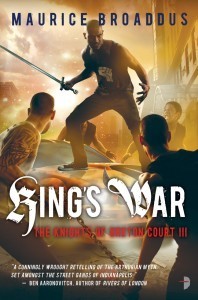 I'm a huge fan of George Pelecanos.
I'm a huge fan of George Pelecanos.
I'm a huge fan of crime novels period, with George Pelecanos and Elmore Leonard being two of my favorite authors, and so it should surprise no one that my urban fantasy series, the Knights of Breton Court, has the pace and feel more of a crime novel that the Arthurian legend creeps into. However, let me back up.
A friend of mine was over at the house raving about the series (it is a little known fact that once you've declared yourself a fan of my work, I'm likely to invite you over to my house and fix you dinner). Now, keep in mind, the way the publishing industry works, I haven't (re-)visited these stories in a couple of years. So it was pretty cool listen to him dissect the work, relate to the characters (I always take "did you live on my block? Cause I know these people" as the height of compliments), and revel in Arthurian geekery as he got all of the legends of the knights of the round table that I wove into the story.
And just as, as a writer, I'm vain enough to believe that the words I put onto page demand to be read—especially as book three, King's War, has just been released—I wanted to talk about the "big idea" behind each of the books. Or at least some of the things rolling around in my head as I was writing them.
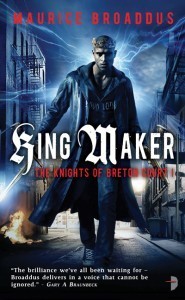 With King Maker, I explored the Jungian idea that we have shadow selves, in this case, the "we" being Indianapolis and the idea that even cities have shadows. So on one level, it's what makes it easy to "believe" that there is this magical underbelly to our everyday reality. One that's always there yet we never both to look for it or acknowledge it, filled with plant elementals, senile mages, trolls, fairies, and all manner of beasties. At the same time, this magical shadow city serves as a kind of metaphor for another kind of shadow. A very real world one: homelessness.
With King Maker, I explored the Jungian idea that we have shadow selves, in this case, the "we" being Indianapolis and the idea that even cities have shadows. So on one level, it's what makes it easy to "believe" that there is this magical underbelly to our everyday reality. One that's always there yet we never both to look for it or acknowledge it, filled with plant elementals, senile mages, trolls, fairies, and all manner of beasties. At the same time, this magical shadow city serves as a kind of metaphor for another kind of shadow. A very real world one: homelessness.
With King Maker we are introduced to a world of outsiders, people who are typically "voiceless" in our society: the homeless, drug addicts, gang members, prisoners, and the poor. The powerless, the invisible, the "least of these" … and we peek into their world, see their faces, and hear their stories. Sometimes through poor choices, sometimes due to circumstances beyond their control, they struggle to maintain their dignity, humanity, lives. As they face fear, loss, spiritual hardships, and their very survival, King rises up.
(I won't lie, I worried about whether this would be criticized for being poverty/pathology porn. And despite the story casting a spotlight on Indianapolis, the tourist board may not like the aspects of the city I chose to highlight.)
[image error]In King's Justice, since the "king's justice" is the time of relative peace in the kingdom, we have time to explore the brokenness that both the heroes and villains operate out of. That there may not be good and bad people as much as people united by a common pain or brokenness, struggling through life who make different choices. That maybe the only thing that separates "heroes" and "villains" is whether they can come together in their woundedness and surround themselves with people who accept them another where they are, how they are, then build them up, affirm them, and encourage them to wholeness. But if they continue to act out of their own efforts and "strength", going it alone, they end up driving people out of their lives.
As King's Justice culminates in "the great sin", an act of betrayal blows up the knight's community and mission, King's War picks up with the long journey of redemption. Personally, my favorite scenes were when I was writing about Lott's attempts at self-punishment and (failed attempts at) reconciliation. He was mired in his wallowing in his brokenness, with an attitude of "You want to point to me as a villain, fine, I'll be a villain." But that's the guilt and shame talking. The thing is, brokenness can be redeemed. Real love risks and offers redemption and when loved well, we're taught about God. In all of our brokenness and (self-) deception, in all of our brokenness and desperation, we can come before the Lord and be fully accepted. This is what the search for the Holy Grail means to me.
So in King's War, I ask the question "what does reconciliation look like?" What does it mean to realize the sin you've committed—hurting not only yourself but also your community—the pain you've caused, the public waves of repercussions of what was thought of as a private sin, and to seek to make things right when you feel like you can't forgive yourself or repay the hurt? What does it look like for a community rocked by scandal to walk into the difficult places and enter into the process of forgiveness? What does it look like to move forward, live, and pursue the mission you were called to do in wholeness?
This was where my head was while writing the books. Toss in the legends of the Green Knight, Red Knight, and Black Knight (in each of the books, respectively), Tristan and Isolde, trolls, zombies, a dragon, elven assassins, Red Caps, griffins, gangstas, and thug life and this isn't your father's King Arthur tale. But it is mine. I hope you enjoy it (though my wife wants me to make sure to say that it doesn't guarantee me inviting you over and cooking a meal).

